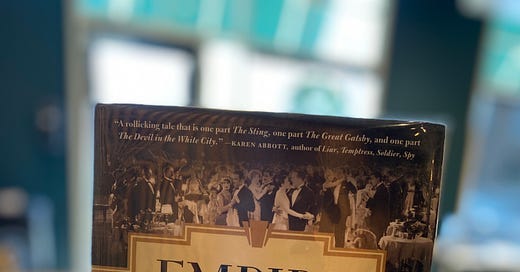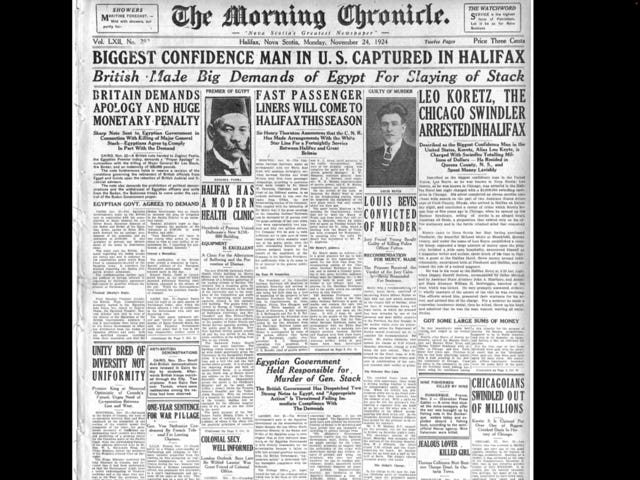The Backstory of America’s Most Infamous Ponzi Scheme Artist
The Hermitage Bookshop in Denver’s Cherry Creek North District has become a favorite hangout of mine over the years. It was there where I recently stumbled upon a book entitled “Empire of Deception: The Incredible Story of a Master Swindler Who Seduced a City and Captivated the Nation” by Dean Jobb.
For many, fraudster schemes immediately evoke thoughts of Bernie Madoff, the one-time chairman of the NASDAQ stock exchange and U.S. financier whose $64.8 billion Ponzi scheme was the largest in U.S. history.
The historical genesis of these sorts of nefarious acts is tied to a con man by the name of Charles Ponzi, who in the 1920s convinced individuals to invest in a lucrative plot tied to postal coupons that didn’t exist. While many were involved in schemes like this before him, his acclaim led it to be named after him.
As the book explores, Chicago lawyer Leo Koretz was running a similar $30 million scheme (worth $494,914,792.90 today) during that period that went on for nearly two decades. By all accounts, Leo lived lavishly thanks to his gullible victims. He purchased a mission overlooking Lake Michigan, limousines, luxury hotel suites in Chicago and New York, and a collection of bootlegged booze.
Author Dean Jobb in his book offers a captivating story of greed and glamour that reads like a novel. When Koretz and the largesse he extracted from the unsuspecting fell apart in 1923, he almost pulled off an even greater feat by disappearing to a life of luxury in Canada’s Nova Scotia province. He was captured in 1924.
Empire of Deception is a riveting page-turner that skillfully captures the exploits of one of the world’s most prominent con artists in history. It places a spotlight on a period where riches abound and everyone felt like they were entitled to it, vestiges of present times
As I often do while reading a book, I reach out to authors to see if they will offer a deeper backstory and context around what they wrote. Author Dean Jobb was kind enough to respond to a few questions I sent his way. Here's what he had to share:
A little about you and your background as a writer
I've published six books on history and true crime. I was a reporter and editor for twenty years before joining the faculty of the School of Journalism at the University of King's College in Halifax, where I now teach in the Master of Fine Arts in Creative Nonfiction program. I covered the court beat for a daily newspaper for years and my university degree was in history, so writing historical true crime was a natural progression.
So what exactly drew you to the True Crime genre?
Stories about long-ago murders and court cases are windows on the past, revealing what life was really like back then and allowing writers to create an accurate portrait of lost and forgotten worlds. They expose how racial prejudice, sexism, and privilege often factored into crimes and how detectives and forensic experts developed new tools and methods to solve them. Plus, crime stories have built-in drama, as police and the courts struggle to hunt down the culprits and bring them to justice.
What was the major catalyst behind your decision to write “Empire of Deception?”
I was researching old crimes in the Canadian province of Nova Scotia, where I live when I found an index card in an archive that mentioned Koretz's Panama oil swindle and described his arrest here in 1924, a year after he fled Chicago. I was hooked. I knew instantly that this was a great story that needed to be told. Here was a con artist who had mastered the Ponzi scheme long before Charles Ponzi came along in 1920. And Bernie Madoff's multi-million-dollar fraud made it a timely story.
Describe your biggest surprise discovery in researching and writing the book.
My biggest surprise? When Koretz was on the lam in Nova Scotia, using the alias Lou Keyte, he befriended a young man named Thomas Raddall and invited him to parties and dances at a secluded lodge that served as his hideout. Raddall went on to become a successful author and I was able to track down his archived papers, which include a previously unpublished account of his time with the man he thought was a generous American millionaire.
When one reads the story of Leo Koretz, the first modern-day figure that comes to mind is Bernie Madoff. How would you compare and contrast these two figures?
I was struck by how much these con artists had in common. Both managed to keep their elaborate schemes running for years (Charles Ponzi himself only managed the feat for less than a year). Both won the complete trust of their victims and were guilty of "affinity crimes," since they drew many of their investors from friends and contacts in the Jewish community. And both seemed so successful that investors begged them to take their money. But there was one key difference: Madoff had a Wall Street profile, an investment company, and a staff to process his phony investments. Koretz managed to single-handedly juggle his complex Ponzi schemes for almost two decades, without arousing suspicion or missing an interest payment.
In your opinion, how pervasive are Ponzi schemes today like that commandeered by Leo Koretz?
It's hard to believe anyone could be taken in by such a notorious scheme, but Ponzi schemes thrive today and investors continue to lose billions of dollars every year. They take many guises, offering sky-high returns for investments in everything from gold to new technologies and cryptocurrencies, but the structure is always the same -- there's no product or asset, and any profit paid to investors is money stolen from newer investors. The schemes continue to work because too many people hope to get rich quickly and want "something for nothing," as one famous con man put it, and are too easily swayed by promises they will reap enormous profits.
What is your greatest hope in terms of what readers of “Empire of Deception” walk away with from reading the book?
Koretz's fraud was carried out against the backdrop of the Roaring Twenties, a time of wealth and excess that ended with the stock market crash of 1929 and the onset of the Great Depression. Empire of Deception recreates the glitz and "anything goes" ethos of the money-mad, celebrity-obsessed Jazz Age and I think readers will see echoes of our own time in the events of a century ago. And, of course, I hope they will be even warier of promoters of investment schemes who promise to deliver outlandish profits.
In closing, can you briefly share about your next book project “Jewels for the Taking”?
Sure. It's the true story of larger-than-life gentleman jewel thief Arthur Barry, who charmed celebrities and hobnobbed with New York’s millionaires as he planned and executed the most audacious and lucrative heists of the 1920s.
Almost forgotten today, Barry was one of the most resourceful and successful burglars in history, stealing diamonds, pearls, and other precious gems worth as much as $85 million today. A slick con artist as well as an accomplished “second-story” man, he slipped in and out of bedrooms undetected as his victims dined downstairs or slept only inches away. And his arrest in 1927 was the prelude to one of the most daring prison breaks in history. Think of it as The Great Gatsby meets Catch Me If You Can and the hit Netflix series Lupin. Like Empire of Deception, it will be published by Algonquin Books.





